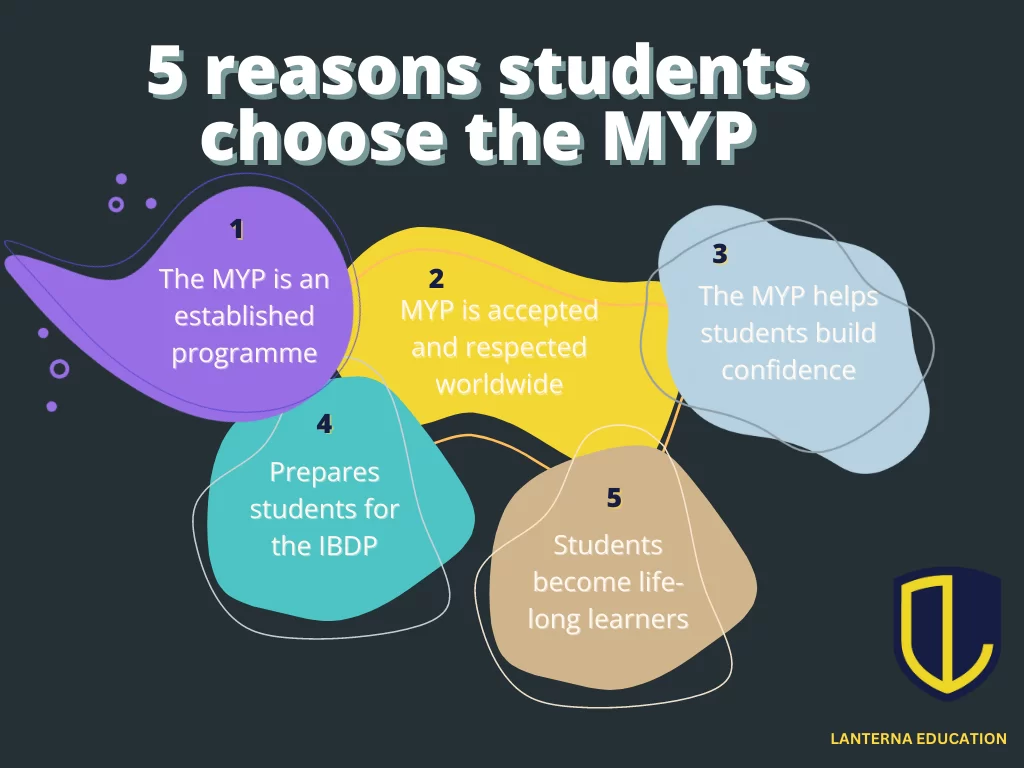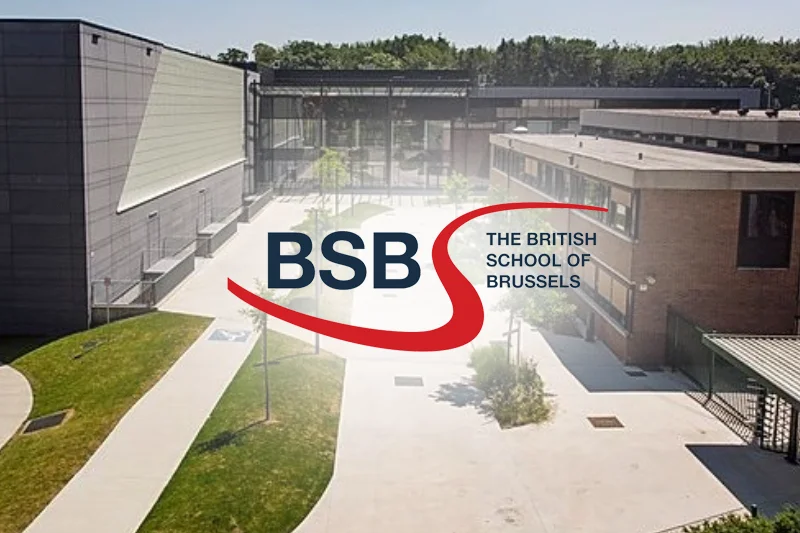A guest author has written this post.
As a parent, you always want the very best for your child. It’s perfectly sensible for you to want to learn everything you can about the International Baccalaureate (IB) Middle Years Programme (MYP).
Finding a straight answer is always challenging. Depending on whom you speak to, the MYP certificate is either a heaven-sent opportunity. Or it sounds like a total nightmare.
As MYP and IB graduates, the dedicated tutors at Lanterna Education are here for you. We want to give you as much information as possible and make it easy for you and your child to find what’s right for them – while ensuring they reach the academic minimums they need to follow their dreams.
Scroll down to find the five benefits of the IB MYP certificate and how the curriculum prepares your child for high school, the IB’s high school diploma programme, university, and, ultimately, life!

IB Middle Years Programme FAQs… Answered!
Before we start listing the benefits of the MYP, let’s look at the IB Middle Years Programme and answer your questions about its educational framework.
What does IB MYP stand for?
MYP is an acronym, and as you’ve probably already figured out, it stands for International Baccalaureate Middle Years Programme.
The MYP is an international secondary education programme offering a pre-IB curriculum to help learners develop critical thinking, academic and social skills, emotional intelligence (EQ) and physical health.
The IB Middle Years Programme (MYP) tries to grow students holistically. They nurture active learners and young minds teaching them how to empathise with others, consider global contexts, and build a successful life full of purpose and continuous growth.
Who are the International Baccalaureate (IB)?
The International Baccalaureate (IB) started in 1968 in Geneva and was initially known as the International Baccalaureate Organization (IBO).
The IB have an NGO consultative position at UNESCO (UN Educational, Scientific, and Cultural Organisation). And they collaborate with the Council of Europe and OIF (Organisation Internationale de la Francophonie).
Basically, the IB is a credible educational NGO that offers educational programmes to prepare students for further studies and a successful career. The IB coordinates with governments and other NGOs worldwide to align IB programmes (and what students study in the classroom) with a country’s national curriculum.
Want to know more about the International Baccalaureate (IB) diploma programme? Read this post to discover why it’s an excellent way to prepare your child for university admissions.
What is an IB World School?
What are IB World Schools? “World school” is the term the International Baccalaureate (IB) uses to describe various educational institutions and organisations worldwide with IB approval. Yes, you read that correctly; Schools need International Baccalaureate (IB) approval to offer IB programmes!
Any establishment or organisation that offers the IB MYP (Middle Years Programme), the IB DP (International Baccalaureate Diploma Programme), or any other IB programme must meet specific standards to earn International Baccalaureate approval. They have a global International Baccalaureate World School community as a result.
As an NGO, the International Baccalaureate (IB) develops partnerships with local school leaders and international schools to offer thousands of middle school students the IB Middle Years Programme (and other IB programmes).
The IB’s authorisation process is just one of the ways the International Baccalaureate ensures students in different international schools get the same high-quality secondary education through the middle-year programme. No matter where they live!
Who can take the International Baccalaureate (IB) Middle Years Programme (MYP)?
Local middle schools and IB World Schools in the US, UAE, Europe, and beyond offer International Baccalaureate programmes to students.
In fact, over 5,000 schools in more than 100 countries currently use the IB’s programmes to develop critical thinking and to start preparing students for further studies and their academic journey.
So children just about everywhere can do the MYP! But, it’s important to remember that the Middle Years Programme (and other IB courses) have set student age limits.
-
IB Middle Years Programme (MYP) student age limits:
The International Baccalaureate (IB) offers the Middle Years Programme (MYP) to nurture pre-teen and teen learners, so the MYP age limit is 11 to 16 years old.
The age limit is in place because the International Baccalaureate’s (IB’s) secondary education programme is for adolescent students. So if your teen is over 16, they should look at the IB’s Diploma Programme (DP).
The Diploma Programme (IB DP) is for high school students and young adults (16 to 19 years old). Its syllabus focuses on preparing students for university admissions and life after school. Learn more about the IBDP here.
-
IB MYP student profiles and programmes:
Is your child independent, a ‘Thinker’? Do they have an ever-inquiring mind? Your child may have a huge heart, an open mind, and a caring nature.
If you Say ‘Yes’ to any (or all) of the traits we mentioned, your child might be a perfect candidate for any International Baccalaureate (IB) programme!
The International Baccalaureate develops programmes and syllabuses, and their student profile describes learners who benefit most from the IB’s educational framework:
- Balanced
- Empathetic
- Caring
- Committed
- Communicators
- Confident
- Cooperative
- Creative
- Curious
- Enthusiastic
- Independent
- Knowledgeable
- Open-minded
- Principled
- Reflective
- Respectful
- Responsible
- Risk-takers
- Show integrity
- Thinkers
- Tolerant
How does the educational framework for the IB Middle Years Programme work?
The MYP is a 5-year programme. Its curriculum has six key focus areas: Creative, Global, Intellectual, Social, Physical, and Personal. International Baccalaureate (IB) Middle Years Programme (MYP) learners also have eight mandatory subjects. Yes, students learn 8 subjects!
-
Middle Years Programme Subject Groups
In the MYP, students study a range of subjects and ideas. And each subject group requires 50 hours of teaching (at least!) every year. The MYP offers the following subject groups:
- Design
- Individuals and societies
- Language acquisition
- Language and Literature
- Mathematics
- Physical and health education
- Sciences
- The Arts
In summary, Middle Years Programme students complete eight academic subjects, requiring at least 50 hours of teaching every year for five years. And do several tests and projects!
-
IB Languages
Students in the International Baccalaureate Middle Year course have to learn at least two languages. Before you panic, we didn’t say “2 other languages.
Students can select two languages: an ‘instructional language” and one “additional language.” Instructional language (aka Language A) is the student’s primary language.
For example, an MYP student who chooses English will receive tests, lessons, project briefs, etc., in English.
While the IB MYP’s “additional language” (aka a student’s Language B) is the language middle school, students choose to study for the IB’s Language Acquisition subject group.
-
Middle Years Programme assessment methods
The IB also requires learners to take part in coursework and long-term personal projects that encourage interdisciplinary learning. These assessments teach students how to improve their own learning experience, develop academic abilities and use critical thinking.
- a) Criteria-referenced assessments: These assessments measure student progress and achievements with a set of criteria. Criterion-referenced assessment methods assess “If” and “how” students demonstrate intercultural understanding, apply knowledge, communicate, use critical thinking skills, and reflect on their experiences and studies.
- b) Collaborative projects: Collaborative projects often include a community project or community service, group research, creative work, presentations, or tasks that call for group problem-solving and discussion. In the Middle Years Programme (MYP), students do group projects as part of the MYP’s interdisciplinary learning experience. It provides many opportunities for learners to work on their communication skills, time management, and teamwork and build their EQ (Emotional Intelligence).
- c) Subject-specific assessments: MYP subject-specific assessments include essays, quizzes, tests, projects, presentations, performances, investigations and experimentation. Students in the IB’s Middle School programmes must complete subject-specific assessments for each MYP subject group. That’s right! Students must meet each of the eight subjects’ unique assessment requirements.
- d) Personal Project: During the final year of the MYP, learners must do an MYP Personal Project. This secondary education assessment is an independent learning project, so students need to complete this assessment. The Personal Project lets middle school students choose a topic, subject or activity that interests them and lets them explore it. The International Baccalaureate (IB) lets Middle Year Programme students learn a new skill, create a product, and participate in various other activities.
- e) Middle Years Programme (MYP) e-assessments: Some IB World Schools even offer MYP e-assessments! These assessments have external markers. MYP e-assessments typically have on-screen examinations that count towards MYP course results. The online assessments also include ePortfolio submissions so that MYP students can submit International Baccalaureate (IB) Middle Years’ work, rationales and reflections.

5 Reasons for Students to Do IB Middle Years Programme (MYP)
Here is a breakdown of the top 5 reasons middle school students should take the IB Middle Years Programme (MYP):
1) The IB Middle Year Programme (MYP) is an established, trusted secondary education programme
At first, students around the world knew the IB Middle Years Programme (MYP) as the IBO MYP. Because in 1994, when the Middle Year Programme launched, the International Baccalaureate (IB) was the International Baccalaureate Organisation (IBO).
Why are we telling you all this? To explain how much experience the International Baccalaureate (IB) has nurtured in curious minds. And how long they’ve helped students develop skills.
The NGO updated the programme twenty years after the International Baccalaureate (IB) started offering the Middle Year Programme to IB schools (2014, to be exact!). And this review is just one of the reasons the IB is a world-renowned secondary education programme!
The International Baccalaureate (IB) relooked the MYP subject groups and curriculum to ensure it encourages students to develop intercultural understanding, think for themselves, and improve their social skills.
The IB Middle Years Programme’s (MYPs) framework and assessment methods review is as important as the IB Middle Years Programme’s history and credentials. We say this because the MYP review means international schools and students taking International Baccalaureate MYP programmes everywhere receive the same quality of education. No matter where they are, students learn relevant skills like critical thinking, independent thought, and time management. At the same time, they prepare for the International Baccalaureate (IB) Diploma Programme (DP), university admissions, and more.
2) The International Baccalaureate (IB) Middle Years Programme (MYP) is internationally-accepted
The MYP certificate is internationally accepted. This means students can take their MYP secondary education qualification or course results virtually everywhere!
The International Baccalaureate (IB) Middle Years Programme is in over 108 countries. In more than 5 000 schools! It’s one of the world’s most popular international secondary education programmes.
The International Baccalaureate (IB) MYP meets international education standards through active, inquiry-based learning. The International Baccalaureate (IB) aims to shape young minds and produce future leaders – Worldwide! Unlike a country’s usual national curriculum, the IB’s internationally recognised curriculum encourages students to focus on language acquisition, develop intercultural understanding, and build critical thinking skills.
3) IB Middle Years Programmes help students build confidence
Middle school students can build confidence by doing the MYP?? Yes! The IB Middle Years Programme helps students develop confidence allowing learners to develop professional and vocational skills and teaching them self-management.
The International Baccalaureate MYP curriculum lets students develop social and critical thinking skills while they gain other confidence-boosting skills and knowledge (like learning how to fact-check!). Students in the MYP learn how to:
- Manage time efficiently
- Plan and prioritise their academic/work-life balance
- Take responsibility for their education and personal development
- Establish healthy work/study habits
- Use different learning strategies/techniques
- Develop empathy, intercultural understanding and social skills
- Boost grades and academic performance
And so much more! All the skills developed over the 5-year Middle Years Programme (MYP) help prepare students for the IB DP, and trains students to trust themselves and believe in their academic capabilities.
4) Middle Years Programmes prepare students for the IB Diploma Programme… and LIFE!
How do IB Middle Years Programmes prepare students for life? The curriculum! The MYP curriculum uses inquiry-based learning to encourage students to explore subjects (or topics) of interest.
Yes, the IB programme for middle school-aged students will help your child transition to the IB diploma programme. And looks great on university admissions transcripts! Projects and assessments offer opportunities for holistic growth. It doesn’t only improve academic performance.
To explain, here’s how the International Baccalaureate (IB) incorporates interdisciplinary learning into the Middle Years Programme (MYP) coursework and assessments:
We’ll use MYP Language and Literature individuals as an example. In IB Middle Years Programme (MYP) Language and Literature, individuals read poetry, give oral presentations, and students complete essays and other written tasks. All the usual work you’d expect from a student learning a language subject. Right?! Except, Middle Year Programme (MYP) students do loads more!
Language and Literature individuals do their regular coursework. Plus, students complete different assessments for eight subject groups too. The Middle Years Programme (MYP) curriculum and the personal projects actually show students how to harness and use their natural curiosity to develop vital skills and reach their full potential.
As MYP and IB graduates, we promise you that managing all eight subjects, meeting personal project demands, and being responsible for your own learning doesn’t only start preparing students for further education.
It prepares learners for the rest of their academic journey (whether it includes the IB DP or not) and a successful career. The programme gives pupils the knowledge, skills, and habits they need to succeed in their academics, careers – life!
5) The IB Middle Years Programme teaches students to become lifelong learners
The International Baccalaureate (IB) Middle Years curriculum centres around teaching learners to think. MYP students must examine, research and consider a range of subjects while taking local, national, and global contexts into account.
The MYP encourages students to develop skills through practical education and using learning resources outside the classroom. The MYP programme teaches students to consider different contexts, think of global perspectives and foster intercultural understanding.
Ultimately, the MYP aims to develop thinkers – students who approach challenges, consider different perspectives and challenge assumptions and biases.

Lanterna Education is here to help you through the MYP and IB Diploma Programme!
The Lanterna Education team have years and years of experience (over 19 years!) helping IB students complete coursework, choose their personal projects and ACE their assessments.
As successful IB graduates and tutors, we have excellent advice for students taking the Middle Year Programme (and their parents!). To ensure a holistic approach to academic success, we believe in fostering not only subject-specific knowledge but also essential skills like critical thinking and effective communication. Our commitment extends beyond traditional tutoring, encompassing a range of educational resources. For instance, explore our insightful blog on the MYP Personal Project, which provides valuable guidance for students navigating this significant undertaking. Moreover, we offer personalized, one-on-one tutoring sessions designed to prepare students for growth throughout their MYP journey and beyond. In addition to academic support, we recognize the importance of cultivating a resilient exam mindset for IB students. Check out our tips on maintaining a positive and focused mindset during exams, a valuable resource for navigating the challenges of the IB program and ensuring sustained academic success. We also provide several educational resources, like this blog on the MYP Personal Project and one-on-one tutoring that prepares students for growth throughout their MYP and further educational studies.



